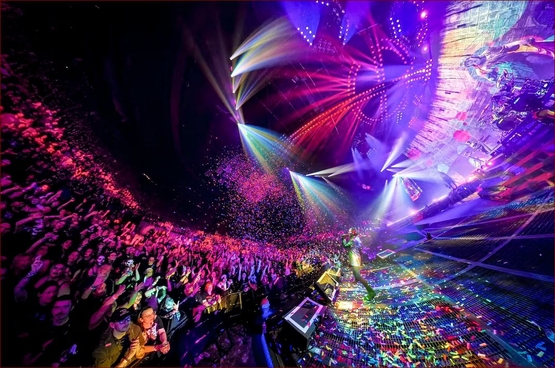
Until I read about last week's Ghost concert at TD Garden in Boston, I had never heard of the Scandinavian metal band. Hard rock has never held much appeal for me, and in any case the ghoulish costumes and Satanic-oriented lyrics Ghost is known for are hardly my cup of tea.
All the same, I now consider myself a fan of Ghost — not for its music but for its decision to rebel against the dictatorship of the cellphone culture that transforms every arena concert into a sea of raised arms holding glowing screens, as thousands of people concentrate more on recording the moment than experiencing it.
When Ghost announced its 2025 world "Skeletour" last year, it declared that it would be a "phone-free experience." Fans attending its performances must permit their mobile devices to be locked in special pouches as they enter the venue, which keeps them from being used during the concert. If guests had to use a phone during the performance, there were designated "phone use" locations in the arena, where an attendant would unlock the pouch for temporary access. Otherwise, no use of electronic devices was permitted. Not for recording, not for pictures, not for texts — not even for checking the time.
Ghost's appearance in Boston marked the first time that cellphones were banned at a TD Garden concert (though there have been phone-free comedy shows). Doubtless some attendees chafed at the restriction. But the overall mood — as a headline on Wasylak's story put it — was one of "surprising joy."
By requiring audiences to stay off their phones, Ghost is doing something increasingly rare in our hyper-mediated age: creating a space for genuine engagement between fans and performers. Tobias Forge, the band's front man, told the French interview program METALXS that the goal was to reverse the "ever-growing distance ... between the crowd and the band" caused by cellphones blocking everyone's faces.
"I just feel that we're having an intimate moment, and it disturbs me that you're filming while we're doing this together," Forge said. "I'm doing something for you to respond to me." That may sound quaint in a world where "pics or it didn't happen" is a generational mantra. But it's a welcome rebuke to a culture that has made the screen more sacred than the scene.
Ghost isn't alone. Indie-rock artist Mitski has expressed dismay at fans who watch her performances through their phones. "It makes me feel as though we are not here together," she wrote in 2022, "as though those of us on stage are being taken from and consumed as content, instead of getting to share a moment with you."
Her language is telling: "taken from," "consumed," "not here together." The sense of communion between performer and audience, once central to the live concert experience, is jeopardized by the impulse to record rather than relate. Bruno Mars cites another frustration: Phones dampen spontaneity and connection. "Being able to read the room ... that feeling goes away when you're looking at a wall of [phones]," he told the Los Angeles Times. "With the cameras, you're like, 'I don't know if I want to try out this dance move tonight,' or you're afraid this joke might go on the internet."
This isn't merely nostalgia for the pre-digital age. It's also an awareness, backed by science, that we experience the world more fully — and remember it more vividly — when we are not trying to capture it through a lens.
In an ingenious 2014 study published in Psychological Science, cognitive psychologist Linda Henkel documented what she dubbed the "photo-taking-impairment effect." She showed that museumgoers who take photos of exhibited objects remember significantly less about them — both visually and conceptually — than those who simply look and use no devices.
Henkel's findings have been replicated by other researchers. A 2021 study at Binghamton University, for example, confirmed that when observers use a camera to preserve what they're seeing, their ability to recall those sights suffers. In effect, the act of recording outsources our recollection of the experience. By turning a lived moment into a mechanical task of documentation, we displace the mental effort that would otherwise encode it as memory. In a chilling sense, our cameras don't just capture the world — they quietly erase it from our minds.
A camera can record a concert. Only attention can make it unforgettable. I may never add Ghost to my playlist. But I admire the band for pushing back against the tyranny of the screen — and for the cultural reminder that we don't need phones to make an experience. Sometimes the most vivid memories of all are the ones we don't try to capture.
Jeff Jacoby is a columnist for The Boston Globe, from which this is reprinted with permission.
(COMMENT, BELOW)

